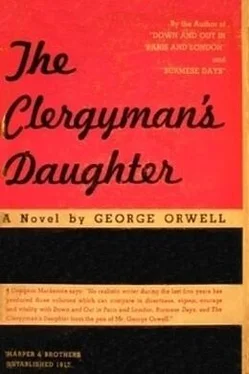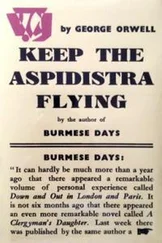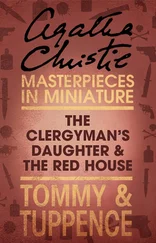This elicited only another muted grunt from the Rector. School plays, pageants, bazaars, jumble sales, and concerts in aid of were not quite so bad in his eyes as Harvest Festivals, but he did not pretend to be interested in them. They were necessary evils, he used to say. At this moment Ellen, the maidservant, pushed open the door and came gauchely into the room with one large, scaly hand holding her sacking apron against her belly. She was a tall, round–shouldered girl with mouse–coloured hair, a plaintive voice, and a bad complexion, and she suffered chronically from eczema. Her eyes flitted apprehensively towards the Rector, but she addressed herself to Dorothy, for she was too much afraid of the Rector to speak to him directly.
'Please, Miss—' she began.
'Yes, Ellen?'
'Please, Miss,' went on Ellen plaintively, 'Mr Porter's in the kitchen, and he says, please could the Rector come round and baptize Mrs Porter's baby? Because they don't think as it's going to live the day out, and it ain't been baptized yet, Miss.'
Dorothy stood up. 'Sit down,' said the Rector promptly, with his mouth full.
'What do they think is the matter with the baby?' said Dorothy.
'Well, Miss, it's turning quite black. And it's had diarrhoea something cruel.'
The Rector emptied his mouth with an effort. 'Must I have these disgusting details while I am eating my breakfast?' he exclaimed. He turned on Ellen: 'Send Porter about his business and tell him I'll be round at his house at twelve o'clock. I really cannot think why it is that the lower classes always seem to choose mealtimes to come pestering one,' he added, casting another irritated glance at Dorothy as she sat down.
Mr Porter was a labouring man—a bricklayer, to be exact. The Rector's views on baptism were entirely sound. If it had been urgently necessary he would have walked twenty miles through snow to baptize a dying baby. But he did not like to see Dorothy proposing to leave the breakfast table at the call of a common bricklayer.
There was no further conversation during breakfast. Dorothy's heart was sinking lower and lower. The demand for money had got to be made, and yet it was perfectly obvious that it was foredoomed to failure. His breakfast finished, the Rector got up from the table and began to fill his pipe from the tobacco–jar on the mantelpiece. Dorothy uttered a short prayer for courage, and then pinched herself. Go on, Dorothy! Out with it! No funking, please! With an effort she mastered her voice and said:
'Father—'
'What is it?' said the Rector, pausing with the match in his hand.
'Father, I've something I want to ask you. Something important.'
The expression of the Rector's face changed. He had divined instantly what she was going to say; and, curiously enough, he now looked less irritable than before. A stony calm had settled upon his face. He looked like a rather exceptionally aloof and unhelpful sphinx.
'Now, my dear Dorothy, I know very well what you are going to say. I suppose you are going to ask me for money again. Is that it?'
'Yes, Father. Because—'
'Well, I may as well save you the trouble. I have no money at all— absolutely no money at all until next quarter. You have had your allowance, and I can't give you a halfpenny more. It's quite useless to come worrying me now.'
'But, Father—'
Dorothy's heart sank yet lower. What was worst of all when she came to him for money was the terrible, unhelpful calmness of his attitude. He was never so unmoved as when you were reminding him that he was up to his eyes in debt. Apparently he could not understand that tradesmen occasionally want to be paid, and that no house can be kept going without an adequate supply of money. He allowed Dorothy eighteen pounds a month for all the household expenses, including Ellen's wages, and at the same time he was 'dainty' about his food and instantly detected any falling off in its quality. The result was, of course, that the household was perennially in debt. But the Rector paid not the smallest attention to his debts—indeed, he was hardly even aware of them. When he lost money over an investment, he was deeply agitated; but as for a debt to a mere tradesman—well, it was the kind of thing that he simply could not bother his head about.
A peaceful plume of smoke floated upwards from the Rector's pipe. He was gazing with a meditative eye at the steel engraving of Charles I and had probably forgotten already about Dorothy's demand for money. Seeing him so unconcerned, a pang of desperation went through Dorothy, and her courage came back to her. She said more sharply than before:
'Father, please listen to me! I MUST have some money soon! I simply MUST! We can't go on as we're doing. We owe money to nearly every tradesman in the town. It's got so that some mornings I can hardly bear to go down the street and think of all the bills that are owing. Do you know that we owe Cargill nearly twenty–two pounds?'
'What of it?' said the Rector between puffs of smoke.
'But the bill's been mounting up for over seven months! He's sent it in over and over again. We MUST pay it! It's so unfair to him to keep him waiting for his money like that!'
'Nonsense, my dear child! These people expect to be kept waiting for their money. They like it. It brings them more in the end. Goodness knows how much I owe to Catkin & Palm—I should hardly care to inquire. They are dunning me by every post. But you don't hear ME complaining, do you?'
'But, Father, I can't look at it as you do, I can't! It's so dreadful to be always in debt! Even if it isn't actually wrong, it's so HATEFUL. It makes me so ashamed! When I go into Cargill's shop to order the joint, he speaks to me so shortly and makes me wait after the other customers, all because our bill's mounting up the whole time. And yet I daren't stop ordering from him. I believe he'd run us in if I did.'
The Rector frowned. 'What! Do you mean to say the fellow has been impertinent to you?'
'I didn't say he'd been impertinent, Father. But you can't blame him if he's angry when his bill's not paid.'
'I most certainly can blame him! It is simply abominable how these people take it upon themselves to behave nowadays—abominable! But there you are, you see. That is the kind of thing that we are exposed to in this delightful century. That is democracy— PROGRESS, as they are pleased to call it. Don't order from the fellow again. Tell him at once that you are taking your account elsewhere. That's the only way to treat these people.'
'But, Father, that doesn't settle anything. Really and truly, don't you think we ought to pay him? Surely we can get hold of the money somehow? Couldn't you sell out some shares, or something?'
'My dear child, don't talk to me about selling out shares! I have just had the most disagreeable news from my broker. He tells me that my Sumatra Tin shares have dropped from seven and fourpence to six and a penny. It means a loss of nearly sixty pounds. I am telling him to sell out at once before they drop any further.'
'Then if you sell out you'll have some ready money, won't you? Don't you think it would be better to get out of debt once and for all?'
'Nonsense, nonsense,' said the Rector more calmly, putting his pipe back in his mouth. 'You know nothing whatever about these matters. I shall have to reinvest at once in something more hopeful—it's the only way of getting my money back.'
With one thumb in the belt of his cassock he frowned abstractedly at the steel engraving. His broker had advised United Celanese. Here—in Sumatra Tin, United Celanese, and numberless other remote and dimly imagined companies—was the central cause of the Rector's money troubles. He was an inveterate gambler. Not, of course, that he thought of it as gambling; it was merely a lifelong search for a 'good investment'. On coming of age he had inherited four thousand pounds, which had gradually dwindled, thanks to his 'investments', to about twelve hundred. What was worse, every year he managed to scrape together, out of his miserable income, another fifty pounds which vanished by the same road. It is a curious fact that the lure of a 'good investment' seems to haunt clergymen more persistently than any other class of man. Perhaps it is the modern equivalent of the demons in female shape who used to haunt the anchorites of the Dark Ages.
Читать дальше









